10 Sleeping Tips for a Long-Haul Flight

Ideally, when you take a vacation, you would sleep in transit and arrive at your final destination feeling rested and ready to take in the sights. However, as anyone who’s ever been on a long-haul flight can attest, things don’t always go so smoothly. You may struggle to sleep and show up feeling jet-lagged and worse for the wear. However, sleep and travel experts say that while you can’t control everything, there’s plenty in your power to make your travels more restful. As you book your tickets, pack your bags, and get ready to board, follow these tips for how to sleep on a plane and make the most of your trip.
RELATED: 10 Clothing Items You Shouldn’t Wear on a Plane.
1
Prioritize rest before you depart.

Worried that they won’t sleep well on a flight, some people try to stay awake for long periods of time before embarking on their travels. However, experts say this approach usually backfires, leading to even more sleep deprivation.
“Start your journey well-rested,” advises Ellen Wermter, FNP-BC, a sleep expert, representative of The Better Sleep Council, and a family nurse practitioner. “Your best chance at restorative sleep is in your home environment in your own comfortable bed.”
2
Exercise beforehand.

Working out in the 24 hours before takeoff can also help you sleep better on a plane.
“Make sure to get in a workout the day before your flight and consider doing some light stretching before and during the journey,” suggests Wermter. “Exercise builds sleep drive, and stretching will keep your muscles happy and relaxed so it’s easier to get and stay comfortable.”
RELATED: 10 Airport Layover Hacks You Need to Know.
3
Choose the right seat.
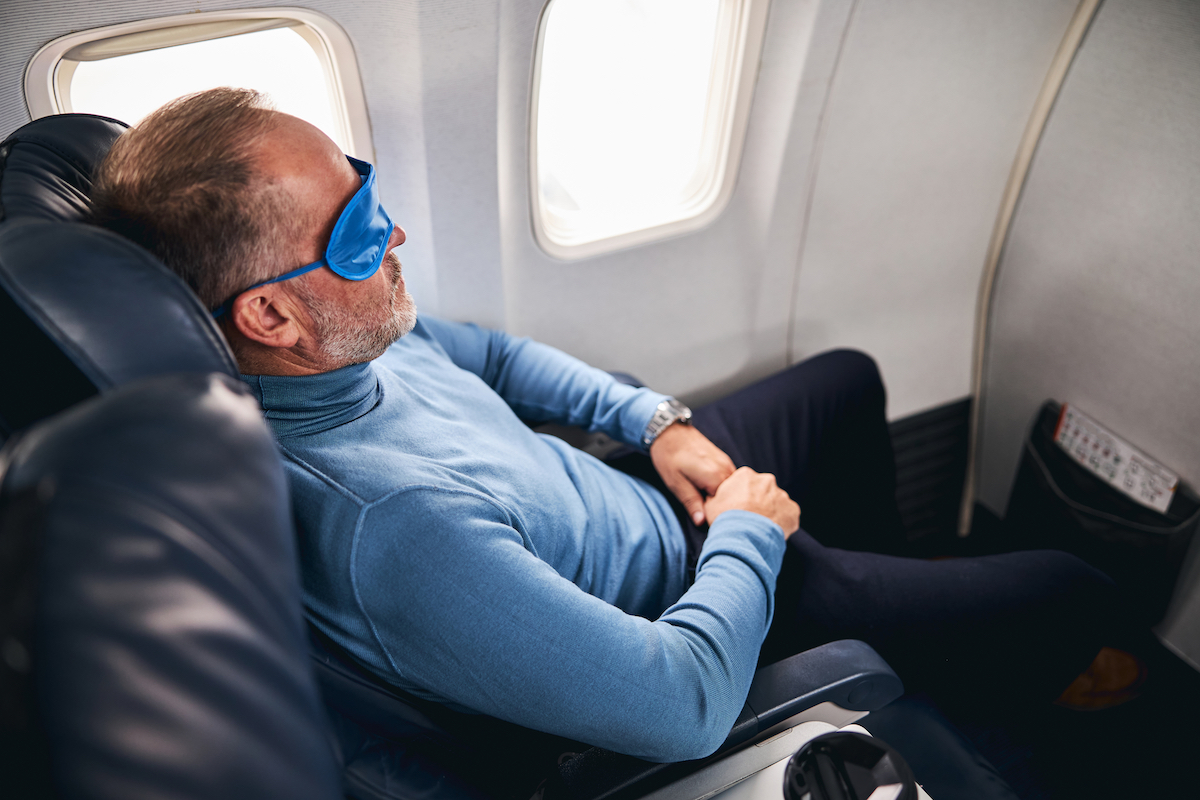
While there are many factors that will be outside your control while flying, you do get to choose your seat (unless you’re flying Southwest). Before doing so, be sure to think ahead about which features will make you most comfortable and allow for optimal rest.
“Choose a window seat to enjoy more elbow space, the freedom to lounge against the wall, and access to the window shade to control the amount of sunlight let in,” says Danielle Desir Corbett, an affordable luxury travel expert at The Thought Card. “With a window seat, you do not have to accommodate fellow passengers who need to use the restroom or stretch their legs,” she adds.
Alternatively, you might ask to be seated in an emergency exit row with ample room in front of it. “Take time to preview the type of plane and consider paying more for extra legroom or a preferred seat,” advises Wermter.
4
Pack the right accessories.
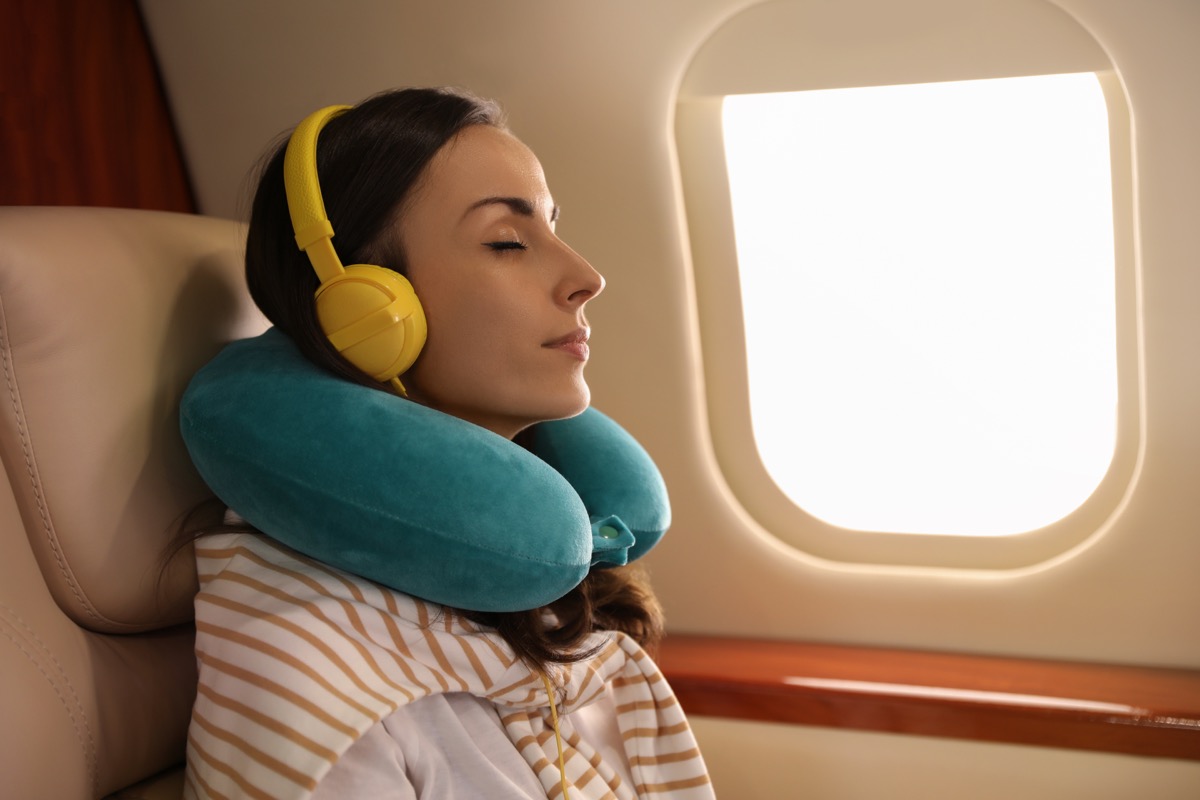
Wermter says that you should also aim to create a “zone of sensory deprivation” by packing essentials like an eye mask, earplugs, and a travel pillow for comfort.
“Pillows provide essential support for the head and neck, which reduces discomfort and enhances relaxation,” agrees Julia Forbes, a certified sleep science coach at Sleep Advisor. “With proper neck support, you are less likely to wake up with pain, allowing for uninterrupted sleep throughout the flight.”
She adds that noise-canceling headphones can also help you sleep better on a long-haul flight. “They block out several noises, which removes distractions, making it easier to achieve deeper, more restful sleep during the flight,” she tells Best Life.
RELATED: The No. 1 Way to Get the Quietest Seat on Every Flight.
5
Eat and drink with intention.
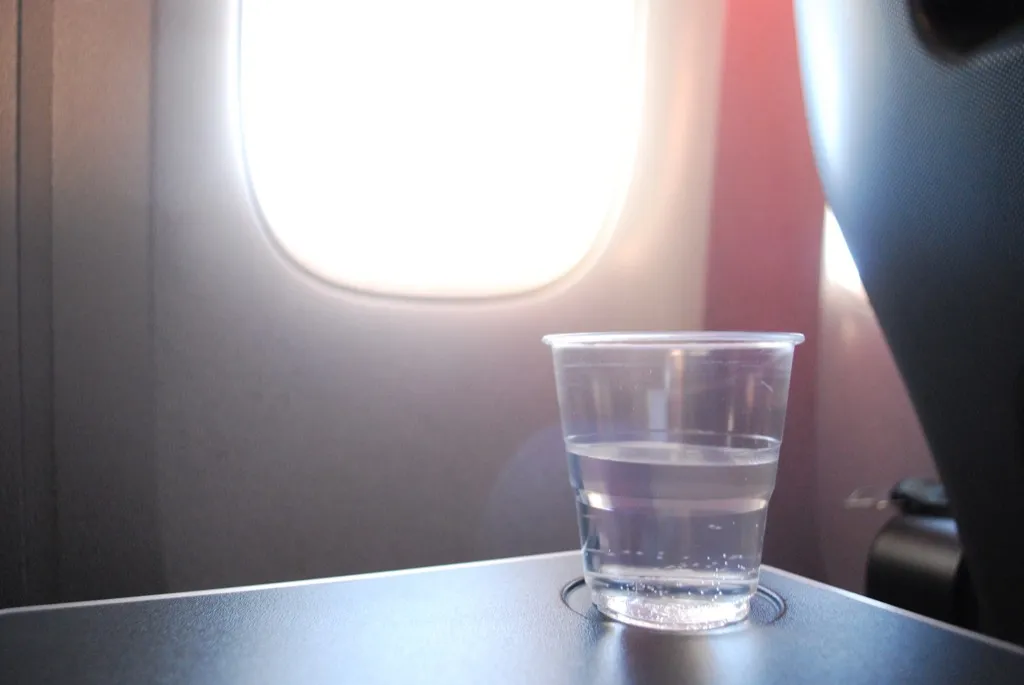
It’s not uncommon for travelers to kill time in the airport by eating a meal before takeoff. However, Wermter recommends refraining from overeating, which can make you uncomfortable once you’re seated. Foods that are high in salt, fat, and sugar are most likely to prove problematic.
“It is also very important to stay hydrated on the flight,” adds Forbes. “Airplane cabins are usually very dry, which can lead to discomfort and trouble falling asleep. By drinking enough water, you stay hydrated which is needed for restful sleep. Staying hydrated can also help alleviate common symptoms of jet lag, such as fatigue and headaches, ensuring passengers arrive at their destination feeling refreshed and well-rested.”
6
Dress comfortably.
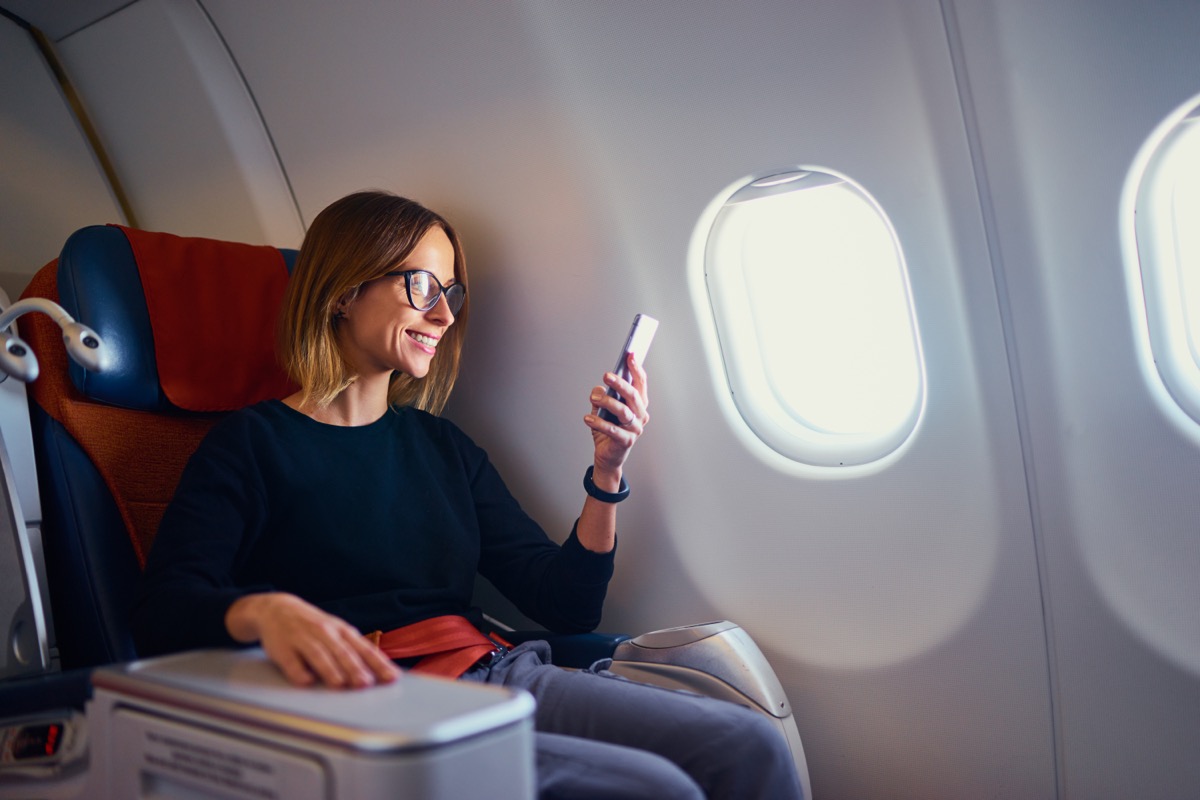
Experts agree that wearing loose clothing made of soft materials can also help you sleep better on a long-haul flight.
“This will make you more comfortable and make it easier to relax,” says Marten Carlson, a certified sleep science coach at Mattress Clarity. “Also, dressing in layers can help maintain comfort throughout the flight. Fluctuations in temperature can make it more difficult to stay comfortable so it is a good idea to be prepared for both a warm or a cold flight.”
Wermter agrees that dressing thoughtfully can make all the difference—and adds that you shouldn’t neglect your feet. “Cozy warm socks for chilly toes may promote relaxation, or you may want to opt for compression socks to help prevent swelling,” she says.
RELATED: 20 Best Travel Pants to Wear That Make Any Trip More Comfortable.
7
Skip the alcohol.
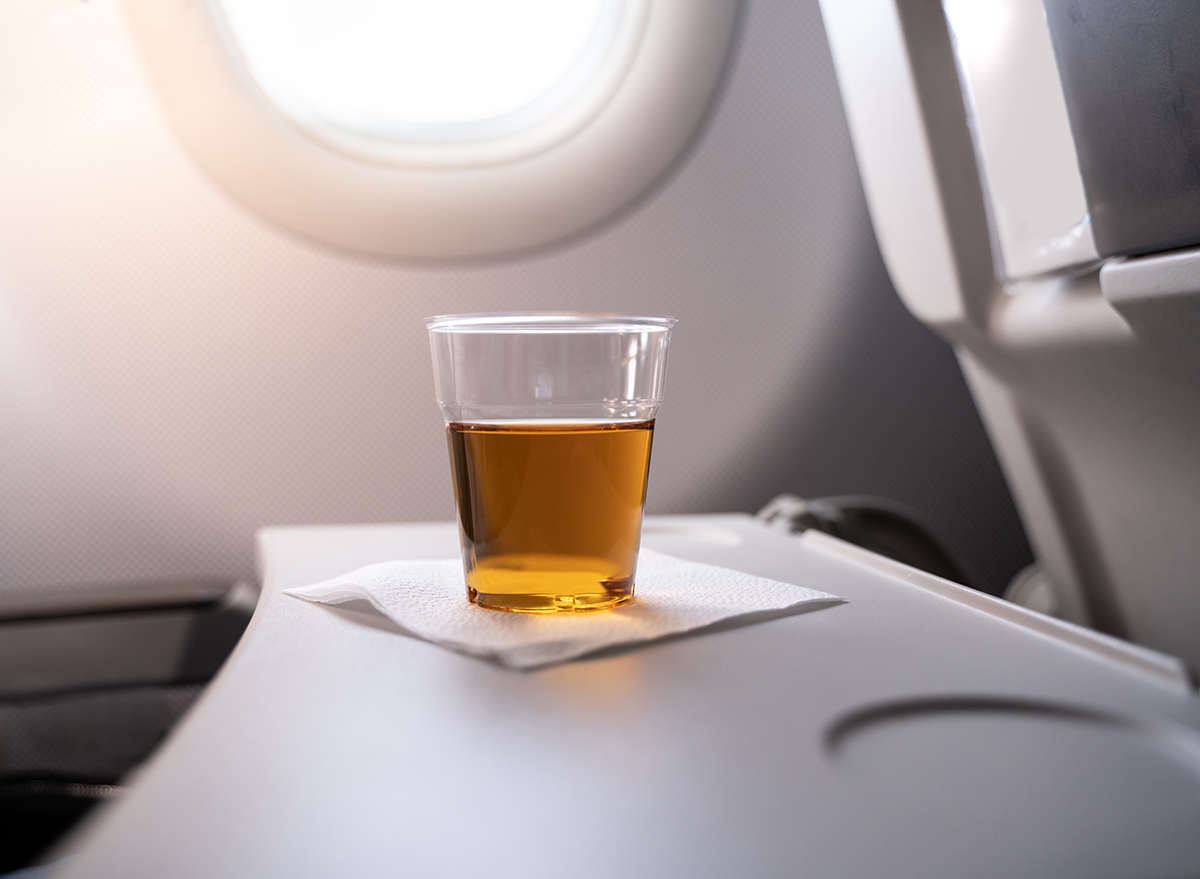
Drinking alcohol on a flight—especially in excess—can quickly backfire. Not only is this generally frowned upon by the flight crew and other passengers, but it can also interfere with your sleep.
“Having a few drinks on a long flight may initially make you feel relaxed, but it will disrupt your sleep and sleep quality, worsening your jet lag due to dehydration and sleep interference,” warns Wermter.
8
Avoid caffeine.
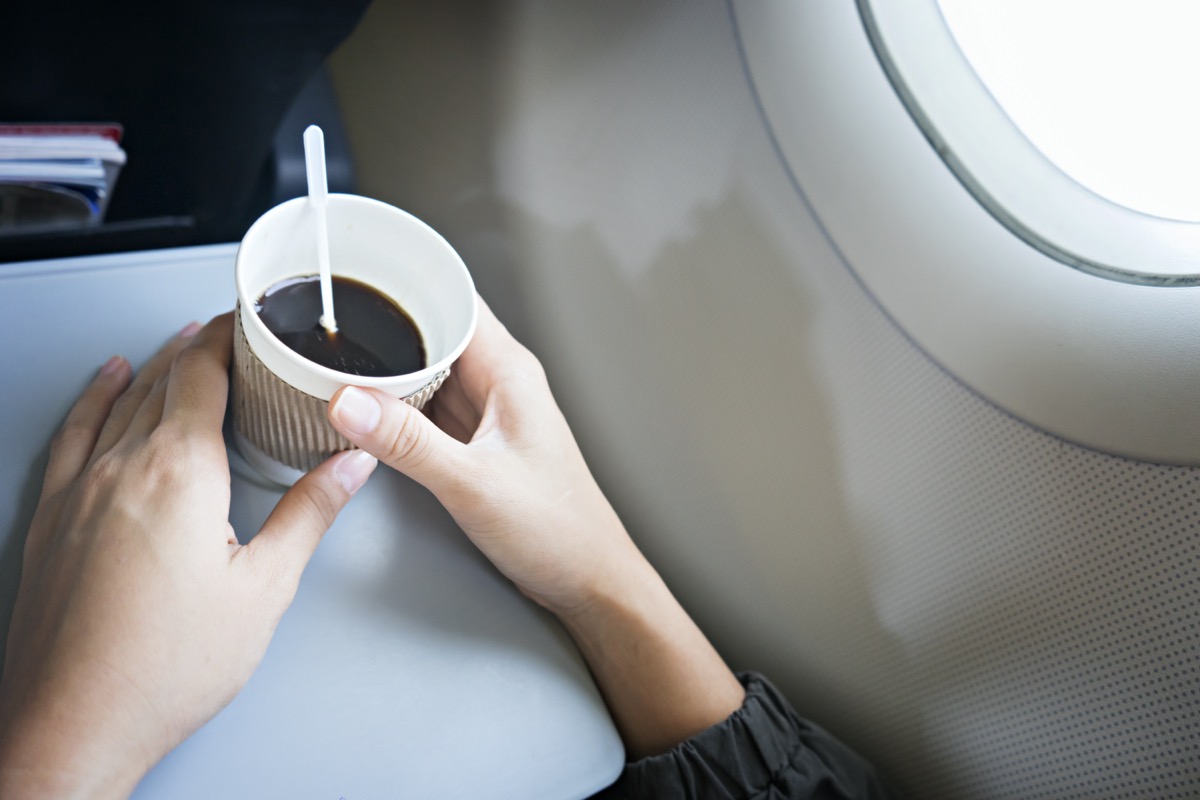
Caffeine can similarly affect your sleep, so experts recommend avoiding it before and during your flight.
“The half-life of caffeine is roughly five hours, meaning five hours after that latte, you still have half the dose of the stimulant in your system,” explains Wermter. “Caffeine binds to adenosine receptors, blocking the interaction that allows your brain to slow down and become sleepy.”
RELATED: 6 Things You Should Never Eat or Drink on a Plane If You’re Over 60.
9
Plan your sleep schedule based on your flight time.
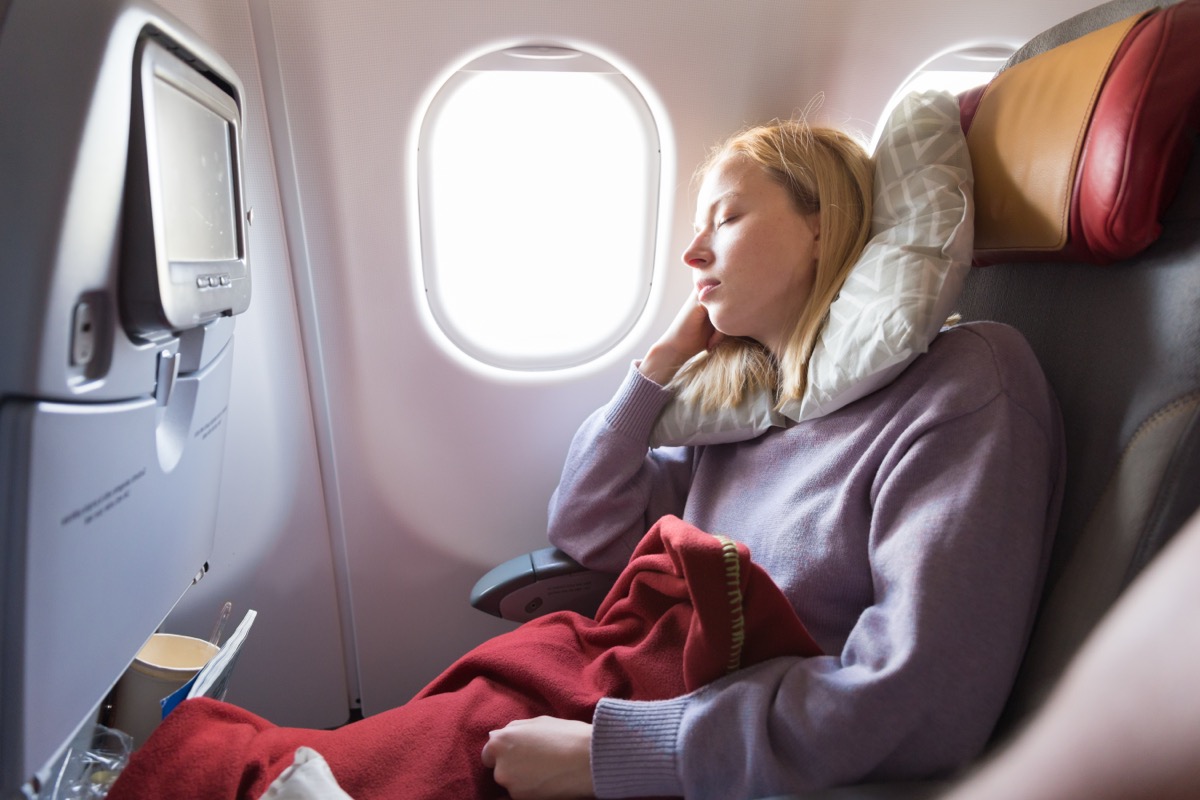
Based on your itinerary, you should be able to set a tentative bedtime for yourself. “This will depend on when the flight leaves and if you are changing time zones,” notes Wermter.
She adds that if you’re feeling tired upon boarding, there’s no reason to put off sleep. “Often people wait until the cabin lights go out, but sometimes that is already an hour or more into the trip. Some of the best sleep I’ve gotten on long-haul journeys is right away—once your row is seated, you can go straight into rest mode,” she says.
However, Will Bolsover, founder and CEO of the travel site Natural World Safaris, says you should also consider the timezone you’re flying into. “It’s all well and good trying to fall asleep straight away on a flight so that you can miss most of it, but if that means getting to your destination jet-lagged, it might not be worth it. If you fly in the evening, try to time your sleeping pattern to coincide with the timezone of your destination, even if that means staying awake for longer,” he suggests.
10
Be patient.
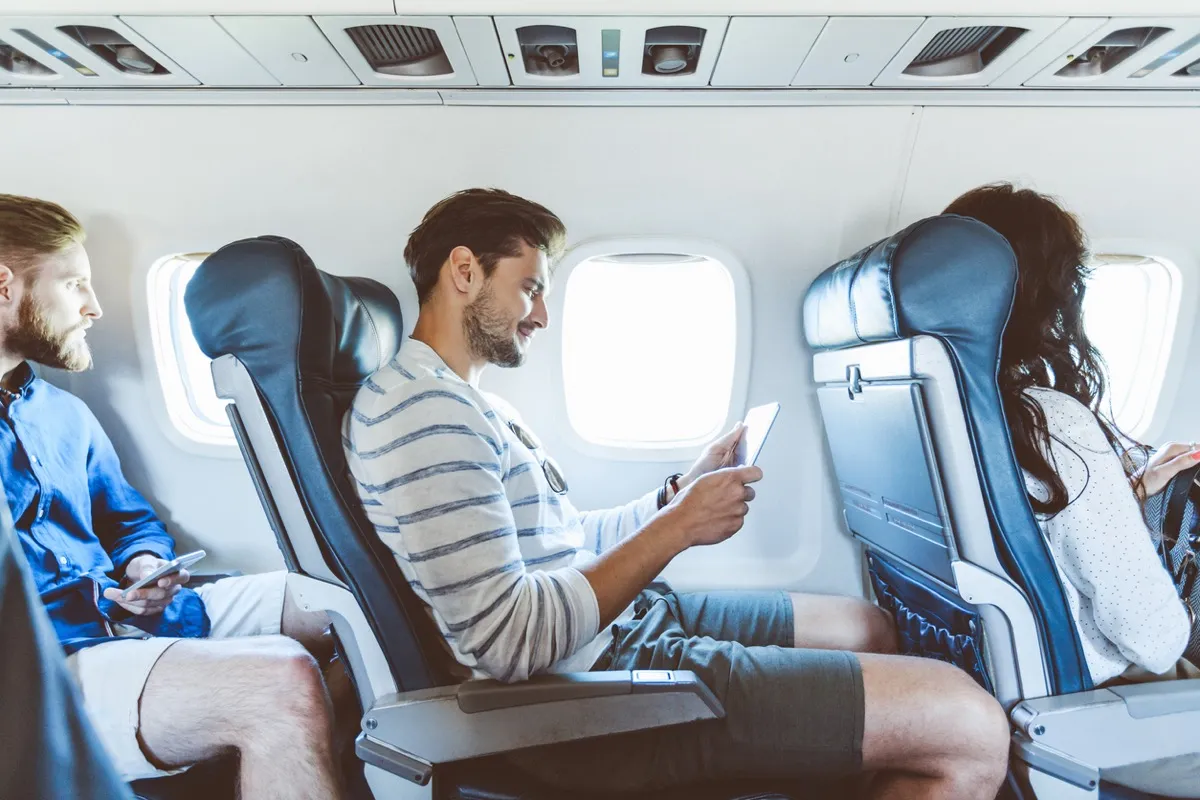
Finally, try to be patient if things don’t quite go as planned. Stressing out about not sleeping won’t make it happen any faster.
“If you’re all set up to sleep and it’s just not happening, try not to get frustrated,” says Wermter. “Sleeping on a plane is not as comfy as your mattress at home, so keep your expectations reasonable. Any rest you get is still beneficial.”